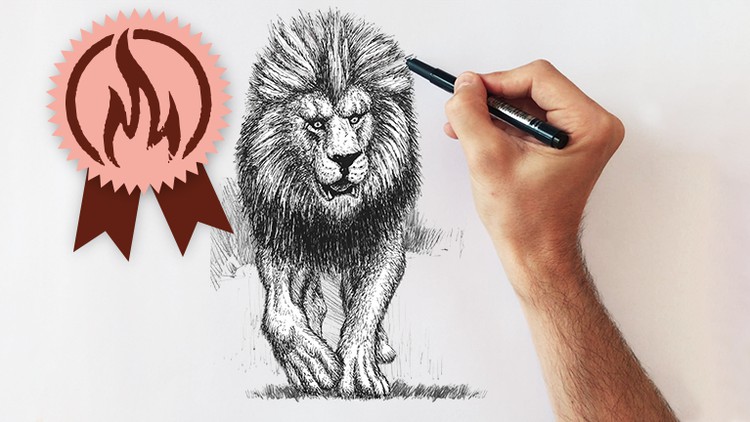
Learn Drawing, Sketching, Pencil Drawing, Illustration, Pen Drawing, Watercolor and much more in a single Course.
☑ You’ll learn the fundamentals of drawing & Sketching
☑ How to draw & sketch
☑ How to manage line weight
☑ Shading techniques
☑ An easy system for drawing
☑ How to Draw to a Professional Level
☑ Draw basic lines and shapes
☑ Axonometric Drawing
☑ Perspective Drawing
☑ Flat Drawing
In this Drawing Course you will learn everything you need to know about drawing. Let me explain why!
There are two main ways in which drawing is taught to students:
Artistic Drawing
(Portrait Drawing, Figure Drawing, Pencil Drawing, Landscape Drawing, Urban Drawing)
Technical Drawing
(Drawing of plans, Technical Drawing, Architectural Drawing, Perspectives with method)
Each of these ways of teaching has its own particular characteristics, but they all focus on a unique way of understanding and teaching Drawing.
However, in this course we will approach the Drawing in a much larger way, since regardless of what you want to express, the drawing is a language of communication and is much more powerful than what you have been told. Thus, we will not concentrate only on one type of drawing or the other, but we will address the bases in order you can master any type of drawing, whether you want to draw faces, cars, landscapes or a new product that you are developing.
Drawing is the main language for:
Artists
Designers (graphic, industrial, apparel, automotive)
Architects
and all those who work with form and space
In this course I concentrate my whole experience of more than 6 years in teaching of Drawing at the University of Architecture in my city. This experience has allowed me to connect the knowledge of the best books of the artistic branch of Drawing (as Betty Edwards and Andrew Loomis) with those of the technical branch (as Frank Ching and Juhani Pallasmaa). From the connection of all this knowledge this course was born, which has a much broader look than a simple Drawing Course.
I currently teach on the Internet everything I have learned over the years, and today more than 49,000 students from 120 countries learn with me, both in Spanish and English. Besides, 4 of my courses have been listed as Best Sellers!
English
Language
Introducción
Introducción
Drawing Course Curriculum
Before continuing
Perceptual and Creative Drawing
Drawing Course Materiales
Drawing Fundamentals
Operations
Drawing Stages
Drawing Stages – Sketch
Drawing Stages – Sketch – Practice
Drawing Stages – Sketch – Practice 2
Drawing Stages – Lines
Drawing Stages – Lines – Practice
Drawing Stages – Lines – Practice Forms
Drawing Stages – Lines – Practice Forms 2
Drawing Stages – Value
Drawing Stages – Value – Practice 1
Drawing Stages – Value – Practice 2
Drawing Stages – Color
Drawing Stages – Color – Practice 1
Drawing Stages – Color – Practice 2
Spatial Systems
Spatial Systems Evolution
Spatial Systems Evolution 2
Spatial Systems Representation
Flat Drawing – Blueprints – 2D Drawings
2D Drawings – Practice Arch of Triumph
Spatial Systems – Axonometries – 3D Drawings
Spatial Systems – Axonometries – Practice
Spatial System – Perspective – 3D Drawing
Spatial Systems – Perspective – Practice
Axonometrie or Perspective?
Sketching Stage
Sketching Composition
Sketching – Objects Structures
Sketching – Proportions and Scale
Sketching – Concept
Sketching – Practice Trees
Line Stage
Line – Forms
Line – Forms – Excercise
Line – Tree Practice
Line – Space
Line – Space – Exercise
Line – Perimeters and Edges
Value Stage
Value – Value Scale – Greyscale
Value – Tree Practice
Value – Light and Shadow
Value – Light and Shadow – Artificial Light Practice
Value – Light and Shadow – Natural Light Practice
Value – Light and Shadow – 2 Objects Practice
Value – Contrast
Value – Value ≠ Saturation
Color Stage
Color – Hue
Color – Saturation
Color – Color Combinations
Color – Color Psychology
Conclusions
Conclusions